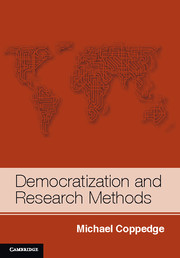Book contents
- Frontmatter
- Contents
- List of tables
- List of figures
- Acknowledgments
- 1 Research methods and democratization
- 2 Defining and measuring democracy
- 3 Criteria for evaluating causal theories
- 4 Checklists, frameworks, and Boolean analysis
- 5 Case studies and comparative history
- 6 Formal models and theories
- 7 Rigor in extensive and intensive testing
- 8 Political culture and survey research
- 9 Quantitative testing
- 10 An agenda for future research
- References
- Index
6 - Formal models and theories
Published online by Cambridge University Press: 05 July 2012
- Frontmatter
- Contents
- List of tables
- List of figures
- Acknowledgments
- 1 Research methods and democratization
- 2 Defining and measuring democracy
- 3 Criteria for evaluating causal theories
- 4 Checklists, frameworks, and Boolean analysis
- 5 Case studies and comparative history
- 6 Formal models and theories
- 7 Rigor in extensive and intensive testing
- 8 Political culture and survey research
- 9 Quantitative testing
- 10 An agenda for future research
- References
- Index
Summary
The approaches discussed in previous chapters – checklists, frameworks, case studies, and comparative history – can generate theory. However, they do so in a mostly inductive way, by generalizing from observations. Scholars working inductively stay close to what they observe whether they are defining concepts, developing theories, laying out a framework, generating hypotheses, or performing tests. The alternative is to work deductively, starting from fundamental axioms and using logic or mathematics to derive hypotheses (which can then be subjected to tests). Deduction and induction sound like opposites in principle, but in practice any attempt at theorizing must do some of both. Observation is impossible without a preexisting set of concepts, a rudimentary theory that tells one what to observe; and deductive theories are always inspired to some extent by real-world cases. Nevertheless, scholars differ in the importance they attribute to the deductive and inductive stages of the theory-building process. Those who emphasize the deductive stages can be said to work with formal models and theories.
Some formal theorists are critical of the more inductive approaches. In fact, some – probably a minority – claim that only deductive theories qualify as theory at all; they demote other general propositions to the lesser status of atheoretical empirical generalizations (Green and Shapiro 1994, quoting Riker, Bueno de Mesquita, and Achen and Snidal). This stance inflates the value of deduction and devalues the inductive processes required for building any good theory. However, formal models have two characteristics that make them different from, if not better than, other sorts of theory. First, formal models have clear and explicit assumptions. They have to; without premises, it would be impossible to derive implications. Stating assumptions explicitly makes it possible for other scholars to see the relationship between one study and another as a sort of tree diagram. The assumptions they share locate their origins on the same trunk or branch; the different assumptions they make push them out onto different branches and twigs. Explicit assumptions therefore provide a way to achieve theoretical integration. Lacking this guidance, the more inductive approaches are harder to integrate. They end up with conclusions that are confined to provisionally bounded temporal-spatial domains that rarely coincide perfectly with the domains of other studies. Second, formal models also have a heuristic: a hypothesis-generating procedure that is logically rigorous, or truth preserving.
- Type
- Chapter
- Information
- Democratization and Research Methods , pp. 158 - 193Publisher: Cambridge University PressPrint publication year: 2012

